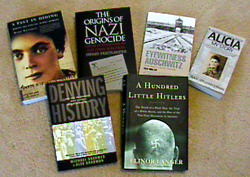Old Announcements (back to top)
- NOTE 12/7/03: Here is the 2001
syllabus. I will be uploading a new syllabus in early January 2004.
The reading list for Winter 2004 will be:
Mark Roseman, Past in Hiding, ISBN: 031242065X (hardcover $10
including shipping at B&N link)
Henry Friedlander, Origins of Nazi Genocide, ISBN: 0807846759
Filip Müller, Eyewitness Auschwitz, ISBN: 1566632714
Alicia Appleman-Jurman, My Story, isbn: 0553282182 (her
website)
Eva Fogelman, Conscience and Courage, ISBN: 0385420285
Michael Shermer, Alex Grobman, Denying History, ISBN: 0520234693
Elinor Langer, 100 Little Hitlers, ISBN: 0805050981
- Dec. 23, 2003: draft 2004 syllabus available [1/7/04:
now final version]
- Jan 4: Please let me know as soon as possible if
you have trouble purchasing the class books (marcuse@history.ucsb.edu).
You can save a substantial amount by purchasing them on-line or used.
Here are some on-line services to check prices, delivery times, and
availability: bookfinder4u
(includes shipping price & info), fetchbook.info;
amazon.com (may be cheaper: free
shipping when grouping new books).
- Jan. 7: Final version of the syllabus is
available (link), as is the "Leading
Discussion" handout (link)
- Jan. 15: sample essay on Roseman added--this is
a model of how to write one of these, using a thesis supported by evidence
(link)
- Feb 5: Several students have asked what makes the
weekly questions "good." I've added a sample on Eyewitness
Auschwitz (link). Note
that they tend to be issues on which different opinions are possible,
and for which different text passages can be used to support different
opinions.
- Feb. 5: For next week's book, you can also check
the book synopsis
on Alicia's website.
- Feb. 5: For a discussion of the anecdote about the
female dancer who shot a guard in the undressing room
in Auschwitz-Birkenau, see: Lawrence Langer, Versions of Survival:
The Holocaust and the Human Spirit (Albany: SUNY, 1982), 43 [UCSB:
PN56.H55 L3]. David Hackett, The Buchenwald Report (Boulder:
Westview, 1995), appendix anecdote 159, includes a version of this incident
by the 15-year-old Czech survivor Janda Weiss, who arrived at Auschwitz
on May 20, 1944. This version was recorded in late April 1945, before
the end of the war.
- Feb. 12: more examples of work added: 2
sets of questions on Alicia; a final paper
on the Diary of Anne Frank from 2001 (link).
- Feb. 12: Nina and Carol Morecki may be coming on
Mar. 3, not Feb. 25. I'll let you know as soon as I
can confirm.
- Feb. 17: Nina and Carol will indeed be coming on
March 3. The reading for that day will be on my UCSB Holocaust Oral
History Project website (link).
The two most relevant documents are Nina's story
from 1939 to 1945, and from
1945 to 2002. (please excuse the random dead links.)
- Feb. 18: Some links about rescuers are available: Stefania
Podgorska in her own words; there is also a film
about her;
- Feb. 23: YIKES! Sorry I didn't think
to update the site sooner, BUT: Nina Morecki and her daughter won't
be able to come to SB until 3/3, so we will read Grobman/Shermer
as scheduled on the syllabus. Since those of you who were absent
will be starting late, definitely try to read pp. 123-259 first. Of
course I'll be lenient on the essay/question due date, but DO be prepared
for class!
- Feb. 23: links for March 3:
Nina's story 1939-45,
1945-2002.
For an impression of the trip I (Prof. Marcuse) took to Lvov with Nina
and Carol in 1999, skim these first
pages of my travel journal, and these photographs.
- Feb. 24: Juan and Rachael pointed out that the IHR
(the denier journal) published a review of Grobman/Shermer in Jan. 2001
(www.ihr.org/jhr/v20/v20n1p45_Shermer.html).
- Feb. 25: Two talks are coming up. If you have missed discussions
or assignments, I'll give 4pts extra credit for attendance, IF you submit
a paragraph summarizing Krell or (for Friday) any panelist's main points:
- Feb. 26, 5pm: TALK: THE LIFE JOURNEY OF CHILD
HOLOCAUST SURVIVORS
Dr. Robert Krell (Psychiatrist, Author, Child Survivor)
Thursday, February 26 / 5:00 P.M. / FREE
Bronfman Family Jewish Community Center, 524 Chapala Street, Santa
Barbara
Robert Krell survived the Holocaust as a hidden child in Holland.
Eventually he became a noted child psychiatrist recognized, in particular,
for his scholarly research and public lectures on the psychological
trauma in Holocaust survivors and their children. He co-authored
an updated, translated edition of Judith Hemmendinger Feist's book,
The Children of Buchenwald: Child Survivors and Their Post-War
Lives (2000) which recounts the story of the 426 young survivors
sent from Buchenwald to France.
- Feb. 27, Friday, 2-4pm, 6020 HSSB: panel discussion "Survivors
of Trauma"
|










